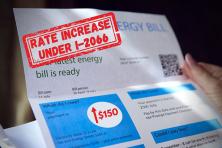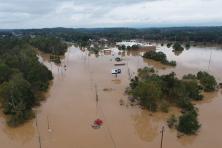Earth Day under quarantine
Earth Day 2020 is being marked this week around the world in a virtual way with discussions, workshops, sit-ins and concerts all online, rather than with the physically present rallies and cultural events which would otherwise bring us together.
Denis Hayes, a key organizer of the first Earth Day in 1970, suggests that in the US this year, we consider commemorating the holiday again in November—bringing our climate and environmental concerns with us to the ballot box. The event’s 50th anniversary also provides a reason to reflect on the climate movement’s origins and missteps, as well as on possibilities for the next 50 years.
Oil prices go bonkers. Good or bad news for the climate?
While Earth Day notices have been peppering our inboxes, the week’s most dramatic energy news came on Monday as the price of oil suffered an unprecedented collapse. With major segments of the global economy temporarily offline, energy usage has quieted dramatically—creating a glut in oil transit and production so intense that refiners are literally running out of room to store their product (hint—maybe better to leave it in the ground). On Monday, the price of a barrel of oil fell to an astounding negative $36.15—producers were actually paying traders to take the stuff off their hands.
With fossil fuel smokestacks sitting idle—coal power’s long-term decline has accelerated during the pandemic—one side effect of the coronavirus has been a temporary reduction in atmospheric pollution. “Global carbon dioxide emissions could fall 5% this year… amounting to the largest annual reduction on record. But climate researchers say there is little reason for celebration, for people or the planet,” E&E News explains.This year’s major CO2 reductions are caused by economic catastrophe, not policy decisions; that’s not a recipe for lasting impact, especially considering the likelihood that pollution will rebound massively once the crisis has passed.
Furthermore, a new American Lung Association study shows that our air quality has actually been declining dramatically over the last several years, without taking into account this season’s temporary reprieve. The worsening situation is due both to climate change and to the Trump administration’s regulatory rollbacks and lack of enforcement of clean air rules.
When the world wakes up, can't it be to a clean energy future?
Fossil fuel companies and heavy industry have not been shy about aggressively lobbying for coronavirus recovery funds,. but clean energy advocates warn that re-investing in polluting, climate-damaging sources of energy would represent a missed opportunity and a profound waste of money.
Investing instead in accelerating the shift towards more clean energy could be the backbone of a successful global recovery, spurring global GDP gains of almost $100 trillion by mid-century—so concludes a new study from the International Renewable Energy Agency. Echoing that advice, some forward-looking businesses across the world are urging their governments to build back better, by making climate change a core element of recovery plans.
Perhaps the most important reason to prefer a green recovery to the status quo is reflected in the intersections between our current public health nightmare and the global climate crisis. Rihana Gunn-Wright notes that “the same populations that are bearing the brunt of the health and economic effects of the coronavirus are the same populations that bear the brunt of fossil fuel pollution,” and calls for a climate-focused coronavirus recovery plan.
A new and unhelpful distraction
Finally, climate journalist Emily Atkins explains at length why she does not want to review Michael Moore’s new climate change documentary.
One thing you can do
Earth Day was yesterday—but many Earth Day online events continue through the rest of this week, not to mention all the recorded streaming content you’ll want to check out after the fact. Check out the multi-day web stream at www.earthdaylive2020.org, where the schedule includes a host of discussions and cultural performances
Presentations from the streams are also available as individual videos you can watch and share. Here’s one of our favorites: Imagine the Future with Xiye Bastida.





